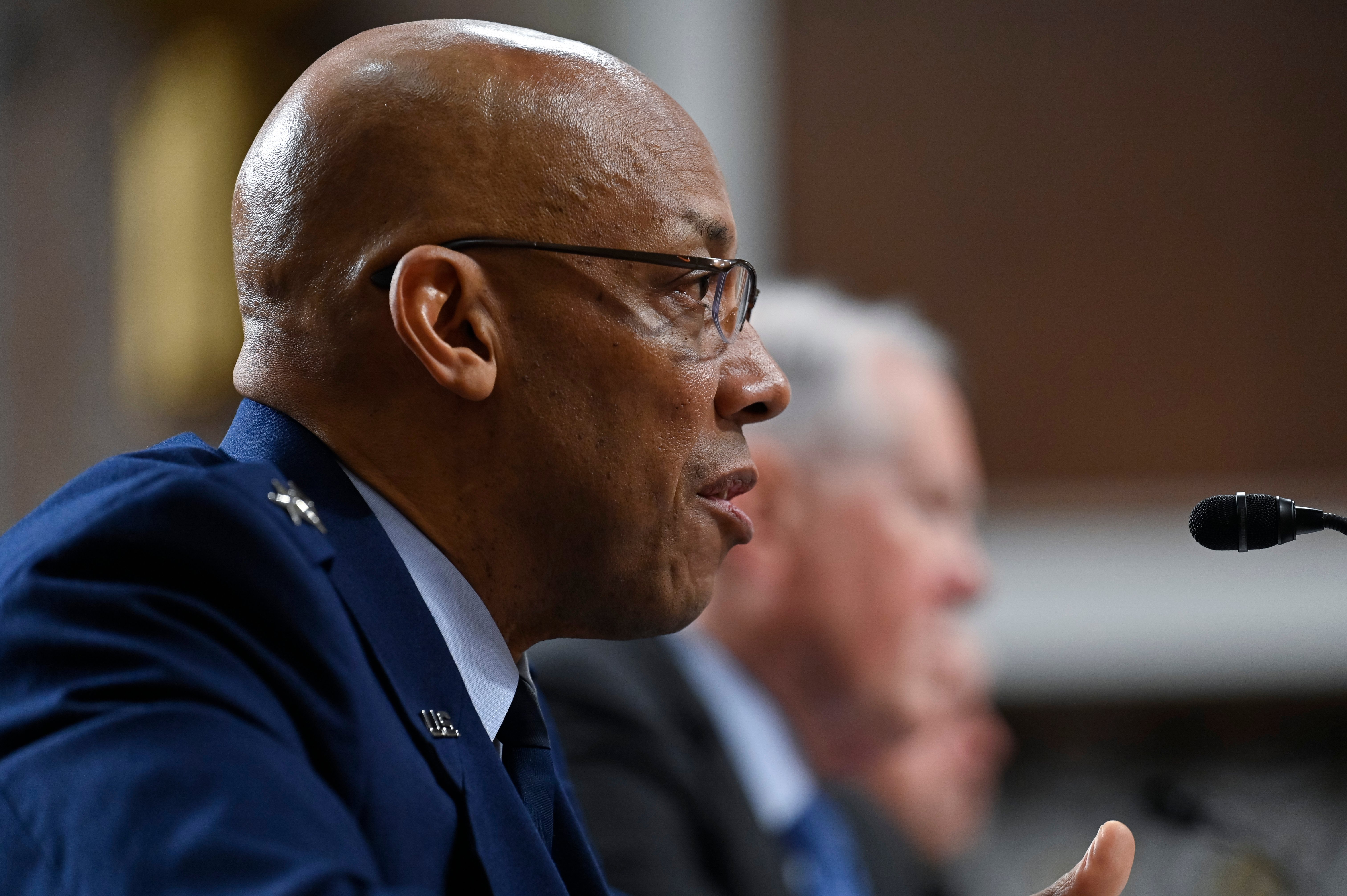
The nominee to be the next chairman of the Joint Chiefs of Staff told Congress he will take a look at how the Department of Defense is set to modernize with an emphasis on developing a joint force.
Speaking before the Senate Armed Services Committee, Gen. Gen. CQ Brown said, “there’s going to be some give-and-take” among the services and inside the Pentagon on what and where to place investment.
Brown, the current chief of staff of the Air Force, said the service chiefs and their Number Twos “have to think what’s best for the joint force” in what they are advocating. Brown said if confirmed he would “re-work the JROC [Joint Requirements Oversight Council] to be a bit more directive” on meeting joint requirements.
The vice chairman of the Joint Chiefs chairs the council, which is made up of the vice chiefs and Marine’s assistant commandant.
Ranking member Sen. Roger Wicker, (R-Miss.), called the Pentagon bureaucracy and defense industrial base “clunky” when it comes to addressing new threats and quickly meeting demands.
In replenishing American weapons and ammunition stockpiles, Brown said multi-year procurement contracts that Congress has already approved provide an incentive to industry to re-start production lines and speed delivery and re-assure workers that their jobs will not be ending soon.
As a number of members noted in their questions, many of those weapons, including precision-guided munitions, have been sent to Ukraine to repel the Russian invasion.
Brown said lessons he’s pulled from the Ukrainian battlefield are the importance of information sharing with allies and partners “well before a crisis occurs” and the “value of logistics” that the Russians hadn’t anticipated when they launched their attack in February 2022.
He added later both of those would apply in a crisis over Taiwan where distances are far greater than in Europe. The differences between the two comes down to geography and infrastructure. In Taiwan’s case,” while there are airfields,” there are no connecting rail lines or highways, making logistics even more challenging.
“You have to preposition capabilities” in the Indo-Pacific and work with allies there before a crisis turns to conflict.
Brown said Ukraine also showed the “timeline for military operations will take far longer than we expect” noting the Russians expected a quick victory but Kyiv’s will to fight blunted the initial Kremlin attack.
From the hearing’s start, culture war issues, including holds on senior officer and civilian promotions over Pentagon policies on service members by traveling out of state for reproductive care were a steady undercurrent of questions and follow-ups.
Chairman Sen. Jack Reed, (D-R.I.), said he was concerned that civilian control of the military was fundamental, but that it must be exercised responsibly without political purpose.
Brown said, “We need to stay out of politics and stay nonpartisan, nonpolitical and at the same time advocate that our civilian leadership is not bringing us in into political situations.” He added he would lead on this issue by “personal example” and expected others to follow suit.
“We have to maintain a standard across the force [to] support the Constitution,” he said.
He said the military, particularly the senior leadership “have a responsibility re-connect with the nation.” That means sharing with the public the reasons “why we joined” and the opportunities they found in military service.
Brown’s father was a career Army officer.
When several Republican lawmakers pressed Brown on Defense Department diversity-equity-inclusion programs causing shortfalls in recruiting, he disagreed.
“All they want is a fair opportunity to perform,” he said.
“But they have to be qualified.”
He added, “I did not want a position or promotion [unless] it was based on my work.”
It also means leaders being held accountable, Brown said in rebuilding public trust as in the gas of the fuel leaks contaminating Oahu’s water supply and inside commands.
The continuing holds on promotions of senior flag and general officer is having an impact through the ranks, Brown said. “We will lose talent” as officers and their spouses question whether there can be “progression in their career field.”
He said the impact that is being felt now will also affect retention in the future and officer accession.
The Pentagon estimates the promotions of 250 senior officers are now on hold. Sen. Elizabeth Warren, (D-Mass.), said that number will grow to more than 600 in the coming months.
Brown’s confirmation will be among those on hold.
Sen. Tommy Tuberville, (R-Ala.), placed the holds on the promotions over Pentagon policy on allowing leave and pay for travel for abortions.
During the hearing, he did not ask Brown about the holds, but the size of the staff of the Joint Chiefs. Tuberville thanked him for accepting the nomination.
“It’s going to be a hard job and anyway we can help you, we’re here to help,” Tuberville said.





